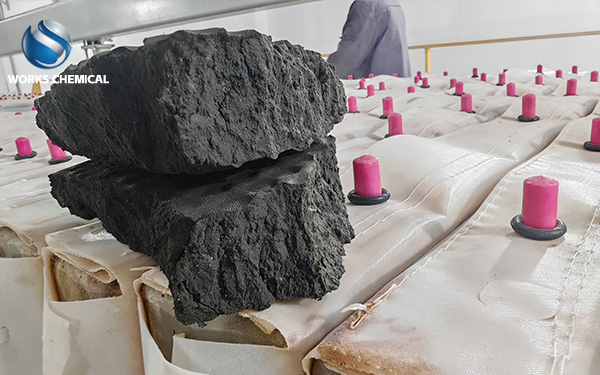
In the field of sludge treatment, the organic matter content of sludge is an important influencing factor. When the organic matter content in sludge is relatively high, its properties tend to be more complex and the difficulty of treatment also increases accordingly. As a chemical agent that can effectively improve the dewatering performance of sludge and enhance the treatment efficiency, what kind of effect can the sludge enhancer play in the treatment of sludge with high organic matter content?

I. The Impact of High Organic Matter Content on Sludge Treatment
Sludge with a high organic matter content usually has high viscosity and water-holding capacity. This is because organic matter contains a large number of hydrophilic groups, such as hydroxyl and carboxyl groups, which can form hydrogen bonds with water molecules, causing sludge particles to adsorb a large amount of water, making it difficult to separate them through conventional dewatering methods. In addition, sludge with a high organic matter content is prone to generating malodorous gases, causing pollution to the environment and also increasing the difficulty and cost of subsequent treatment.
Ii. The Working Principle of Sludge Efficiency Enhancers
Sludge enhancers are generally composed of multiple chemical components, and their main working principles include the following aspects:
Youdaoplaceholder0 Charge neutralization : The surface of sludge particles usually carries a negative charge. The cationic components in the sludge enhancer can neutralize these negative charges, reduce the electrostatic repulsion between sludge particles, and make it easier for sludge particles to aggregate together.
Youdaoplaceholder0 bridging effect : The high-molecular polymers in the sludge enhancer can form Bridges between sludge particles, connecting multiple sludge particles together to form larger flocs, thereby enhancing the dewatering performance of the sludge.
Youdaoplaceholder0 Destroy the colloid structure : Sludge with high organic matter content often forms a stable colloid system. Sludge enhancers can destroy this colloid structure, allowing sludge particles to release the adsorbed water, facilitating dewatering.
Iii. Performance of Sludge Efficiency Enhancers in Sludge with High Organic Matter Content
Youdaoplaceholder0 significantly improves dewatering efficiency : In practical applications, when dealing with sludge with high organic matter content, the sludge enhancer can effectively destroy the colloidal structure of the sludge and reduce its viscosity. For instance, a certain sewage treatment plant was dealing with domestic sludge with a relatively high organic matter content. Before the application of sludge enhancers, the moisture content of the sludge after dewatering was as high as over 85%. However, after the application of sludge enhancers, the moisture content could be reduced to around 65%, significantly enhancing the dewatering efficiency.
Youdaoplaceholder0 Enhance the strength of sludge flocs : The flocs formed by sludge with high organic matter content are often loose and easy to break. The high-molecular components in the sludge enhancer can form a strong bridging structure between sludge particles, enhancing the strength of sludge flocs. During the dewatering process, even under considerable mechanical pressure, the sludge flocs are not prone to breakage, thus ensuring the stability of the dewatering effect.
Youdaoplaceholder0 Improve the settling performance of sludge : Sludge with high organic matter content is prone to phenomena such as floating and stratification during the settling process, which affects the subsequent dewatering treatment. Sludge enhancers can improve the settling performance of sludge, enabling sludge particles to settle rapidly and evenly, forming a stable sludge layer, and providing convenience for subsequent dewatering operations.
Youdaoplaceholder0 Reduce the dosage of chemicals : Compared with traditional dewatering chemicals, the sludge enhancer can achieve the ideal dewatering effect with a smaller dosage when treating sludge with high organic matter content. This is because sludge enhancers have stronger specificity and can more effectively destroy the structure and properties of sludge, thereby reducing the dosage of chemicals and lowering treatment costs.
In conclusion, when the organic matter content in sludge is relatively high, the use of sludge enhancers can achieve remarkable results. It can not only enhance the dewatering efficiency of sludge, strengthen the strength of sludge flocs, and improve the settling performance of sludge, but also reduce the dosage of chemicals and lower the treatment cost. Therefore, for the treatment of sludge with high organic matter content, sludge enhancers are an effective means worthy of promotion and application.